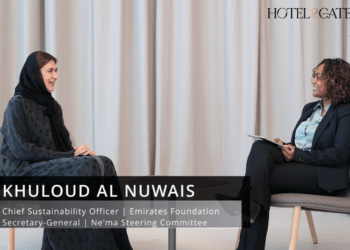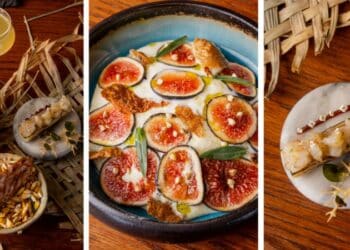Hotel News Middle East speaks to hoteliers across the region about how they are meeting guest expectations for a personalised service…
 The days of hotels being able to offer a one-size fits all service are long gone. The advent of the millennials has changed the playing field for all and sundry, hoteliers now have to think out of the box and do it fast.
The days of hotels being able to offer a one-size fits all service are long gone. The advent of the millennials has changed the playing field for all and sundry, hoteliers now have to think out of the box and do it fast.
In this age of instant online reviews, it has never been so important for hotels to get it just right. But how exactly do hoteliers provide a personalised experience?
“The way we see it, personalisation can be translated into convenience and novelty,” says Alexander Schneider, general manager, Nikki Beach Resort and Spa Dubai.
“When discussing novelty, we have decided and focused our offering on deviation from the norms by providing unforeseen facilities and refreshing experiences. We have acknowledged and accepted guests who aspire to be different and this is how we conducted our talent selection. I strongly believe in creating a pulsating and unique culture that induce an air of creativity in service delivery and this is appealing nowadays to our audiences.”
Pascal Dupuis, general manager, Address Boulevard, says: “We pay close attention to know the guest’s personal favourites in terms of food, facilities, and leisure choices. “We also look at adding our touches to the service we offer to create memorable moments such as providing a personalised welcome message on the TV screen in the room to greet the guests upon arrival, or preparing a special dish for our regular guests. The hotel continuously adopts the latest technology to deliver a tailored experience for each guest from booking to post checkout.”
It isn’t easy to find out what each individual guest requires, but that should not mean you do not make the effort, says David Allan, cluster general manager, Radisson Blu Hotels, Dubai Waterfront and Dubai Canal Views.
“Simply put, guests like to be welcomed with a personalised and customised experience, they need to be able to express themselves and we take the time to recognise this,” he says.
Caroline Rowe, director of marketing and communication, Media One Hotel added her voice to the argument that each hotel has to offer something unique.
“With the high volume of hotels in Dubai, it’s important to offer a differentiating factor for guests in order to build brand loyalty and help them feel connected to the hotel,” she says.
One of the main issues, says Joe Nassoura, director of rooms, Fairmont Dubai, is that everyone has their own idea on what personalisation means which makes it a tricky balancing act to get right.
“In the 1950s, personalisation meant that when a customer steps into the local grocery store, the shopkeeper would know the person’s name, her family, what she last ordered and what her preferred brands were,” he says.
“Nowadays in the hospitality industry, personalisation means that guests are being treated as unique individuals – as if at this very moment, they are the only guests at the hotel.”
It is one thing to identify what needs to be delivered, it is quite another to be able to provide it.
“Simply put, great service is not enough. How you deliver the experience is most important and makes a real impact,” says Schneider.
One way in which Allan and his team has identified a clear way into delivering a personalised service is by having a very precise selling point.
“We have set our stated aim to be the friendliest 5-star hotel in Dubai. My team and I have been working towards it and personalisation is one of the most important ingredients,” he says.
“Personalisation starts well before a guest arrives at the hotel and ends long after they have left. We are not trying to say we won’t make mistakes and everything will always be perfect, but it is about how you tackle it, how you treat every situation and how we approach every individual.”
Rowe says that being an independent hotel allows Media One extra room to provide personalised services.
“Our ‘Go To Team’ is dedicated to offering personalised service for VIP arrivals; from welcome gifts for VIP guests to tokens of appreciation for long stay and returning guests – these WOW moments are tailored to each individual,” she says.
“If guests require an airport transfer, we ask them if they would prefer to be picked up in our regular van or our bright F150 – complete with racing helmets – to enhance their experience.”
Media One has also launched a floor aimed specifically at the female traveller as well as providing a free smartphone in each room for guests to use.
Millennially-minded
The rise of the millennials is probably one of the most used phrases in the hospitality industry across the globe, so much so that’s in danger of becoming a cliché, but the Millennials are on everyone’s lips for good reason.
Schneider says: “We are entering a phase of a higher evolutionary pressure on the market, which will result in a displacement of products that are no longer cutting-edge or that do not deliver to the expectations of the feeder markets.
“This phenomenon is extremely important in order for a destination to stay fresh and exciting.”
Dupuis says, “Our millennial guests are technology savvy so the most important thing is to provide the latest tech-amenities across the hotel.
“Connectivity is a key factor for the guests so we have dedicated resources to ensure fast and efficient internet access. Our guests can now connect to our wi-fi network from the car park to the rooftop and even in the elevators.”
The advent of the millennials caused significant changes in the industry, says Allan.
“In today’s world guest are allowing brands to intimately connect with their personal thoughts and feelings, just think about Facebook, Instagram, Twitter and Snapchat,” he says.
“The guests are already sharing their personalities, we as hoteliers just have to find a way to transform those desires into memorable moments.”
Another aspect that Schneider feels is key to a successful operation is creating guest loyalty.
“It is a fundamental core of the resort’s service standard to apply emotional intelligence while interacting with our guests thus, reaching their core and developing a strong emotional connection, which ultimately leads to customer loyalty,” he says.
“It is well known that loyal guests spend around 30% more than first-time guests do.”
Doing the simple things well is an ethos that many successful businesses across the world live by – but in the modern age it is easy to be tempted to overcomplicate matters.
Personalisation doesn’t necessary have to cost money – it can be a gesture as simple as addressing a guest by his nickname, knowing their preferences and remembering them,” says Nassoura.
“At the end of the day, it’s not about the product – it’s about the people that make a difference.”
Tomorrow’s world
The future of personalisation is very much linked to technology, says Dupuis.
“Technology is continuously evolving and the future trends in the hospitality industry will be based on this one aspect,” he says.
“It would largely depend on how the hotels adopt, connect and maintain a certain degree of engagement before, during and after the guest’s stay. I would also point out the role of mobile applications and how the guest interacts with the hotel using these new channels.”
With guests becoming more tech-savvy how manageable are the expectations of modern guests?
“Guests’ expectations are very much manageable, as this exactly what Nikki Beach specialises in – creating unique and memorable experiences,” says Schneider.
“A combination of micro-niching and developing our brand further to really differentiate from others is a current trend.”
Building a community of people with common interests and experiences and reinforcing loyalty through one-of-a-kind experiences is key, says Schneider.
Allan is clear on the message he wants to send.
“The key is to be proactive instead of reactive, allow every single team member to express their personalities and understand how important it is to recognise the guest’s personality,” he says.
“It might not always be easy to read what guests are looking for, but if you at the very least make the effort their expectations become way more manageable and you will start off with a satisfied guest.”
Personalisation should be practised discreetly and create a surprise for the guest, suggests Nassoura.
“For example, sending a cake at a restaurant to those tables with a birthday or placing rose petals on the bed for the honeymooners – it’s generalisation and not personal anymore, because it’s being done for everyone,” he says.
“The moment we step up the norm and start doing something different which makes guests say “wow!” – that’s when we have succeeded.”
Providing the perfect personal service is clearly not a simple process – but what is clear and simple to understand is that hoteliers across the region are leaving nothing to chance.



































































